 | Anne Jaap Jacobson - Social Science - 2010 - 340 pages
...that Hume might hold the view that there is something like one human nature. For example, he writes: Even Mathematics, Natural Philosophy, and Natural...men, and are judged of by their powers and faculties. Tis impossible to tell what changes and improvements we might make in these sciences were we thoroughly... | |
 | Alfred Ayer - Philosophy - 2000 - 152 pages
...Their reason, as set out by Hume in his introduction to the Treatise, was that 'all the sciences have a relation, greater or less, to human nature and that,...they still return back by one passage or another' (T, p. xv). There are sciences like those of logic, morals, criticism, and politics which have a closer... | |
 | Miguel A. Badía Cabrera - History - 2001 - 358 pages
...ideas," gives some plausibility to the following suggestion: 'Tis is evident, that all the sciences have a relation, greater or less, to human nature; and...dependent on the science of MAN; since they lie under the cognisance of men, and are judged of by their powers and faculties. (THN, xix). This is not solely... | |
 | John H. Zammito - Philosophy - 2002 - 600 pages
...inauguration of a course in anthropology in the year 1772. Tis evident, that all the sciences have a relation, greater or less, to human nature; and...men, and are judged of by their powers and faculties. . . . Here then is the only expedient, from which we can hope for success in our philosophical researches.... | |
 | Marina Frasca-Spada - Philosophy - 2002 - 252 pages
...p. xiii. 39 By the way, this is exactly what Hume has promised in the introduction to the Treatise. 'Even Mathematics, Natural Philosophy, and Natural...men, and are judged of by their powers and faculties' (77xv). such questions, because it is by nature a self-questioning activity. The reason for this is... | |
 | Paul Gifford - Business & Economics - 2003 - 244 pages
...Introduction to his Treatise of Human Nature, published in 1 739: 'Tis evident, that all the sciences have a relation, greater or less, to human nature; and...them may seem to run from it, they still return back [to it] by one passage or another . . . There is no question of importance, whose decision is not compriz'd... | |
 | Isaiah Berlin - Philosophy - 2000 - 260 pages
...Hume, who believes that the sciences of 'Mathematics, Natural Philosophy [that is, natural science], and Natural Religion, are in some measure dependent on the science of man',1 believes this because the task of philosophy is to deal with the ultimate ingredients of all... | |
 | David Hume - Philosophy - 2003 - 484 pages
...strong presumption against it, were it so very easy and obvious. Tis evident, that all the sciences have a relation, greater or less, to human nature; and...Religion, are in some measure dependent on the science of M.\\; since they lie under the cognizance of men, and are judged of by their powers and faculties.... | |
 | Paul Hyland, Olga Gomez, Francesca Greensides - Enlightenment - 2003 - 496 pages
...Hence the Scottish historian and philosopher David Hume wrote, 'Tis evident, that all the sciences have a relation, greater or less, to human nature; and...they still return back by one passage or another.' He continued: 'In pretending [claiming] therefore to explain the principles of human nature, we in... | |
 | Alexander Broadie - History - 2003 - 386 pages
...first theme is broadly methodological and arises from Hume's conviction 'that all the sciences have a relation, greater or less, to human nature, and...they still return back by one passage or another'. The study of human nature was thus to be based upon empirical evidence: as Hume himself made clear,... | |
| |